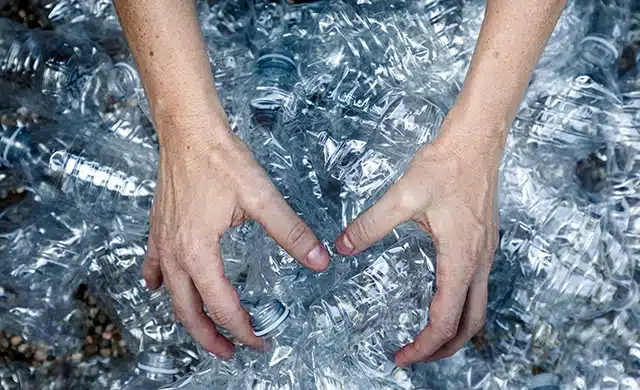
03 Jul 6 months of the Tax on Plastics
Six months have now passed since the tax on non-reusable plastic containers began to be applied and we have met with Josep Picola, Rieusset’s Financial Director, so that he can explain what adapting to this new tax has been like for the company.
What is the purpose of this tax?
Reducing the use of non-reusable plastic containers. With this tax, an attempt is being made to force the companies that generate these non-recoverable containers to use them to a much lesser extent and/or to replace them with other types of containers without plastic or ones that can be reused for the same purpose for which they were designed.
In this sense, the Gerosa Group, of which Rieusset is a part, also values as a priority all actions that drive us towards greater sustainability and in defense of the environment.
Do you think that this objective will be achieved?
It is very difficult to know – it will depend mainly on the ability of companies to find substitute materials. This is an important point, since not everything can be replaced by another material at a cost and quality that is viable. There are many health and safety requirements that make it very difficult to replace plastic containers with paper or cardboard, or other materials, without environmental impact.
Recycling and a circular economy of these materials are sought, but … Are we really technically prepared to recycle or recover so many tons of material? One thing is what we want and another one is the ability to do it.
The tax, for example, is not applicable to recycled plastic, but currently this plastic barely makes it possible to cover the need for plastic used as packaging and/or shrink wrap. There is no capacity to be supplied as a semi-finished product that is used for non-recoverable containers. Therefore, these resources should have been strengthened beforehand, so as to now have the capacity to use recycled plastic.
Who is affected by this tax?
It affects countless companies, since we all use plastics in one way or another, at the very least as packaging, such as plastic for shrink-wrapping pallets or products that come and go.
However, through the passing on of costs, the tax will end up penalizing the end user, not only the companies. Therefore, if it is a tax that ends up affecting the end user … Why isn’t it applied directly to the end user at the time of sale? And it could then compensated when these containers are re-incorporated into the plastic recovery cycle.
What were the beginnings of the application of the tax like?
First of all, it is necessary to remember that its entry into force was on January 1, 2023, but up to 15 days before there was still great uncertainty as to whether it would enter into force or not. Many requests were made by unions and associations for it to be reconsidered due to its complexity and lack of Regulations in the articles of the Law. In addition, we are the first country in the European Union to apply it.
Having said this, the first step was to read the law, become familiar with it and to what extent it would affect us. It is a difficult law to interpret correctly or to be sure if it is being applied properly, since:
- There are countless applications of plastics, plastic adhered to paper or other materials.
- It is necessary to interpret if we are dealing with a non-reusable container.
- The law has some exceptions, certain situations in which certain products may not be subject to this tax. We had to analyze carefully and see in which cases the Law affected us.
In our case, this tax affects us mainly when buying raw materials in the EU, and the impact of the tax on customers in Spain. For customers outside of Spain, the tax is deductible at the time the material leaves the country.
In practical terms, what has the introduction of the tax meant for Rieusset?
We have made IT adaptations to start working with this new tax. The software has had to be modified, because it is information that the law also requires to be reflected on invoices or in separate certificates.
In addition, because of this tax, we have to send to the Tax Agency computer records of all purchase movements of semi-finished plastic products purchased in the European Union and all sales of products containing plastic that leave Spain. This information must be sent to the Tax Agency every month in computer records. Aggregate data cannot simply be dumped; it all has to be individual. In other words, the entire computer system has to be adapted so that we are able to collect and process all this information and send it to the Tax Agency. Clearly, this entire process is laborious. For this point, a 7-month adaptation period has been granted. On July 31, all the records for the first half of the year will have to be delivered.
Additionally, we had to ponder a dilemma… What do we do with our price lists? Do we modify them because of this tax? Do we maintain the prices and reflect the tax as a separate item? We have chosen to keep the same rates and reflect the tax separately, but it will probably end up being integrated into the price list.
This tax also affects our cost analysis, which is an internal effect, but one that is also considerable. It is an added complexity that alters all the analyses that we had previously and that have also been modified.
Has it affected your clients in any way?
Yes, the entire production chain is affected by this tax. Clients also needed to modify their computer systems to comply. The first months were difficult for everyone.
Have you received any help or support from the administration for the implementation of the tax?
We have not received any kind of help, let alone financial. With regard to support, the Tax Agency offers information on its website, but it is not entirely sufficient. There is also the possibility of asking questions to the administration, but this is not very agile.
Do you think it is an effective measure?
I think it is not the most effective one, and in addition to the large amount of work and costs involved, it implies the obligation for companies –practically all companies– to manage this tax, many of which do not have decision-making power to reduce non-reusable packaging, yet it ends up affecting us in an important way. Therefore, I would have looked for a different mechanism, without affecting the majority of companies that do not have the ability to influence the change in the use of these materials or packaging.
What future do you foresee with this measure?
I am hopeful that at some point it will be removed. This does not mean that we do not need to reduce the use of plastics in some cases. But the resources that are to be collected with this tax, from my point of view, should not involve added complexity for the entire industrial sector; a formula should be found that does not provoke excessive adaptation costs compared to the amount to be collected.
| We Manufacture: | Meet Rieusset: |



